Social Welfare
Classrooms of Change: NEP 2020 and the New Era of Schooling
Posted On: 28 JUL 2025 6:08PM
|
Key Takeaways
|
- 5+3+3+4 structure and NCF-SE 2023 (National Curriculum Framework for School Education) promote experiential and competency-based learning. CBSE board exams now include 50% competency-based questions, and subjects are offered at two levels.
- NIPUN Bharat and Vidya Pravesh have reached over 4.2 crore students across 8.9 lakh schools
- Over 1.15 lakh SEDG (Socio-economically Disadvantaged Groups) students and 7.58 lakh girls enrolled in inclusive residential schools; PRASHAST App supports disability screening in line with The Rights of Persons with Disabilities Act(RPwD Act). Indian Sign Language is now a subject, with 1000+ ISL videos and talking books developed
- 4 lakh+ teachers trained under NISHTHA; Foundational Literacy and Numeracy (FLN) and Early Childhood Care and Education (ECCE) modules integrated via DIKSHA. 72% schools now have internet, and e-Jaadui Pitara brings AI-powered multilingual learning to early grades
|
ntroduction: Transforming Indian Schooling
On July 29, 2020, India turned the page on a new chapter in education, one not just of reform, but of reinvention. With the launch of the National Education Policy 2020 (NEP 2020), the country laid out an ambitious roadmap to transform its schools into spaces where learning is no longer confined to textbooks, marks, or memorisation.
NEP 2020 envisions a schooling system that is flexible, inclusive, and deeply learner-centric; where curiosity is encouraged, creativity is nurtured, and classrooms reflect the diversity and dynamism of the world students will one day shape. By reimagining every element of school education, from curriculum and pedagogy to assessments and teacher development, the policy seeks to restore joy, relevance, and purpose to the learning experience.
Rooted in India’s rich civilizational heritage and guided by the principles of equity and excellence, NEP 2020 aligns closely with global commitments like ‘Sustainable Development Goal 4: ensuring inclusive and equitable quality education for all’. It recognises that meaningful learning must begin early, build strong foundations, and continue for life.
In bridging India’s educational legacy with the demands of the 21st Century, the policy aspires to create classrooms that empower and not just inform.Key Reform Initiatives
Early Childhood Care and Education ( ECCE) and Foundational Learning
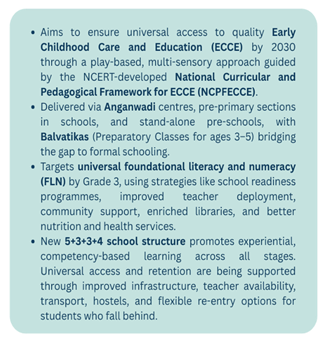
The National Education Policy 2020 places early learning at the heart of school reform, recognising that over 85% of brain development happens before age six. The policy focuses on Foundational Literacy and Numeracy (FLN) and ECCE. Foundational Literacy and Numeracy (FLN) refers to the ability to read with understanding and perform basic mathematical calculations by the end of grade three. FLN, along with good health and socio emotional well-being , lays a strong foundation for further learning and development, and reduces chances of children dropping out of the school system altogether.
The Initiatives like National Initiative for Proficiency in Reading with Understanding and Numeracy (NIPUN Bharat) Mission, School Preparedness and Early Childhood Education (Vidya Pravesh), Bal Vatikas that provide 3 years of pre-schooling under the 5+3+3+4 structure are Initiatives In this direction. Vidya Pravesh Programme promotes school readiness in children entering Grade I through a 12-week play-based module. For the first time a National Curricular Framework for Foundational Stage (NCF-FS) has been developed for children between ages 3-8 . Jadui Pitara is a collection of play based Learning Teaching Material (LTM) like toys, games, puzzles, puppets, posters etc for 3 to 6 years age group. An e-Jaadui Pitara has also been launched.
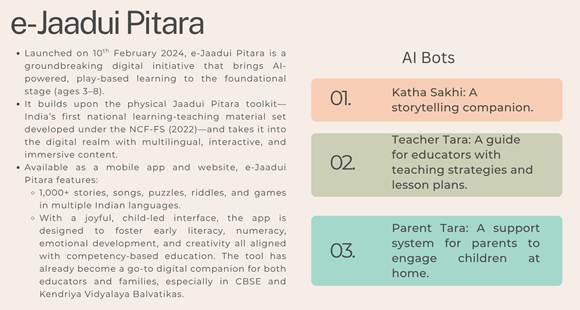
In addition, primers have been developed in local languages for FLN learning in mother tongue. Capacity building of teachers for the FLN stage Is another focus area. Over 12 lakh teachers have been trained under the NISHTHA teacher training programme. Digital technology is also being utilized for the FLN education, with age and development appropriate materials In multiple languages being made available on DIKSHA platform.
Key Achievements :
- NIPUN Bharat Mission launched in July 2021 to achieve FLN by 2026–27.
- Vidya Pravesh: 4.2 crore Grade 1 entrants across 8.9 lakh schools benefited from a 12-week play-based school readiness program.
- Balvatikas (preschools): Over 1.1 crore children enrolled; 496 model centres functional in KVs.
- Jadui Pitara launched for play way learning
- Curriculum: NCF-FS adopted by all 36 States/UTs; 121 multilingual primers developed.
- Digital Tools: 2,778 FLN content pieces on DIKSHA (National ed-Tech platform); e-Jaadui Pitara App launched in 2024.
- Teacher Training: 12.97 lakh teachers trained under NISHTHA (Teacher Training Programme) FLN
- The Impact of these initiatives are reflected in national learning assessments. As per the PARAKH Rashtriya Sarvekshan, 2024, at Grade 3 level, students in State Government schools outperformed those in private and urban schools, with rural children scoring higher than their urban peers in both Language and Mathematics. As per ASER 2024, Foundational reading levels among Class III children in government schools have reached their highest since 2005: 23.4% children could read Grade II-level text in 2024, up from 16.3% in 2022 and 20.9% in 2018. Arithmetic proficiency has also improved, with 27.6% of Class III students now able to perform basic subtraction, compared to 20.2% in 2022 and 20.9% in 2018
Samagra Shiksha and Universal Access: Reducing Dropouts, Increasing Equity
In the spirit of ensuring “Education for All”, the Government of India has revitalized school access and retention through Samagra Shiksha, the integrated scheme spanning pre-primary to higher secondary levels. India’s Gross Access Ratios (GER) reached commendable highs in 2023–24: 97.8% in primary and 96.57% in upper primary. Crucially, dropout rates have also decreased with improved school infrastructure 98.4% of schools now have drinking water, 97.1% girls’ toilets, 85.1% ramps, and 85.1% electricity coverage.
Under this umbrella, inclusive hostels have become a vital support system for marginalised learners. The country now boasts 1,137 Netaji Subhash Avasiya Vidyalayas for 1.15 lakh students from socio-economically disadvantaged groups (SEDGs), and 5,269 Kasturba Gandhi Balika Vidyalayas (KGBVs) housing 7.58 lakh girls. Additionally, schemes like PM JANMAN and DAJGUA are actively constructing hundreds of new hostels for tribal populations, ensuring no learner is left behind due to geography or background.
National Institute of Open Schooling (NIOS) is directly addressing the issue of out-of-school children, by collaborating with states and creating flexible entry points (OBE levels Children and Adults) helping to achieve the goal of 100% Gross Enrolment Ratio (GER) by 2030. NIOS has developed special provisions for Agniveers to complete their 10th or 12th certification
Vidyanjali is a digital platform under Samagra Shiksha launched to connect schools with volunteers and organisations. The platform allows schools to request support in volunteer services and contribution of assets/materials and enables individuals, NGOs, and corporates to fulfill these needs. Over 30,000 asset contributions and 34,000+ activity-based engagements have been successfully completed. The initiative has positively impacted more than 1.7 crore students
PRASHAST and Inclusive Classrooms: Enabling Every Child’s Potential
NEP 2020 champions inclusion as a central pillar of school education. The launch of PRASHAST, a digital pre-assessment tool, has empowered teachers to identify and support children with any of the 21 disabilities listed in the RPwD Act 2016. Available in both Flipbook and mobile app formats, PRASHAST equips regular and special educators with tools for early intervention—laying the groundwork for inclusive learning environments.
Further, Indian Sign Language (ISL) has been formally introduced as a subject at the secondary level, marking a watershed moment for deaf learners. More than 1,000 ISL videos and talking books across 46 subjects have been developed and made accessible, making learning more inclusive than ever before. These steps, along with NIOS’s Inclusive Education and Gender Policies, earned India the UNESCO King Sejong Literacy Prize in 2021.
Encouraging Multilingualism : NEP 2020 promotes inclusive, multilingual learning to ensure every child thrives.
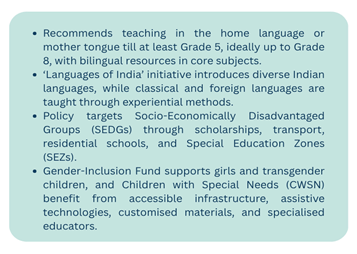
Curriculum Reform: From Content Overload to Competency-Based Learning
Replacing the old 10+2 model, NEP 2020 ushered in a 5+3+3+4 structure, supported by the NCF-FS (2022) and NCF-SE (2023) frameworks. This includees (i) National Curriculum Framework for the Foundational Stage (NCF-FS) and (ii) the National Curriculum Framework for School Education. These heralded a seismic shift toward play-based, multidisciplinary, and experiential learning, from foundational years through to secondary. Textbooks like “Mridang” (English), “Sarangi” (Hindi), and “Joyful Mathematics” are not only age-appropriate but deeply rooted in Indian cultural and environmental contexts. Notably, the NCF-s advocate for toy-based pedagogy, interdisciplinary content, and multilingual classrooms, with resources translated into 22 Scheduled Indian languages. A new subject “The World Around Us” for Grades 3 to 5 introduces learners to science and social studies in integrated, experiential formats. With every lesson designed to promote critical thinking, creativity, and curiosity, India’s classrooms are being reimagined as dynamic spaces of joyful learning.
The NCFs also recommend vocational exposure from Grade 3 onwards and offers of Vocational Education as a subject from Grade 6 onwards. To align skill education with regular curriculum the National Credit Framework (NCrF) was notified by University Grant Commission (UGC), and CBSE has notified the Standard Operating Procedure (SOP) for implementing the operationalisation of NCrF For Class 9 to 12 in schools.
Leveraging Technology
DIKSHA (Digital Infrastructure for Knowledge Sharing) is India’s national platform for school education, It provides digital learning resources in 133 Indian languages. The platform supports QR-coded textbooks facilitates self-paced learning, It provides professional development courses like NISHTHA for teachers. DIKSHA was central to PM e VIDYA’s “One Nation, One Digital Platform”during the pandemic.
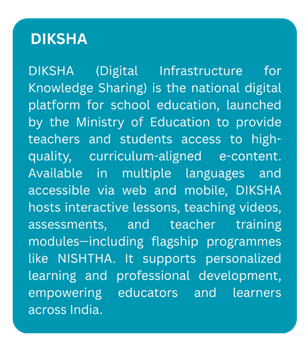
Rashtriya Vidya Samiksha Kendra (RVSK) is a super-connector of systemic school education data generated from State/UT VSKs throughout the country to enable collation and analysis of data for decision making across policies, programs and schemes. The objective is to provide real-time data on key performance indicators (KPIs) of the school education system for evidence-based decision-making by policymakers and administrators.
Under PM eVidya, 200 DTH TV Channels make quality education accessible to all students across the country
Empowering Teachers for Quality Education
Empowering Teachers for Quality Education
NEP 2020 positions teachers as the driving force of school transformation through strengthened recruitment, training, and career progression.
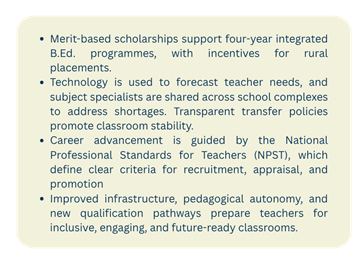
Key Achievements:
- NISHTHA Training: Over 14 lakh teachers trained across ECCE and FLN.
- DIKSHA, the national EdTech platform under NEP 2020, provides multilingual teaching resources, interactive lessons, and integrated NISHTHA training modules, supporting educators, students, and parents alike.
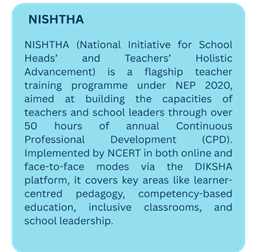
Transforming Assessment and School Governance
NEP 2020 transforms assessment by shifting from rote-based exams to continuous, formative, and competency-based evaluation.
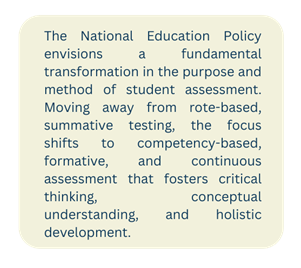
Key Achievements:
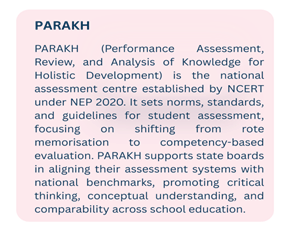
- PARAKH, anchors the shift to competency-based, formative evaluation.
- 2024 Rashtriya Sarvekshan covered 21.15 lakh students and 2.7 lakh teachers, with rural and government school Grade 3 students showing strong performance, validating NIPUN Bharat.
- Holistic Progress Cards (HPCs) provide a 360-degree view of student development, covering academics, creativity, socio-emotional skills, and community engagement.
- School Quality Assessment and Assurance Framework (SQAAF) aims to Improve quality of schools through five critical domains: Administration, Curriculum, Assessment, Infrastructure, and Inclusiveness.
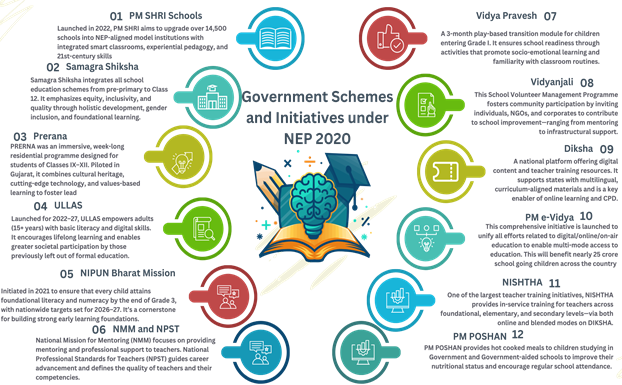
Government Schemes
Conclusion
Over the past five years, the National Education Policy 2020 has laid the foundation for a more inclusive, learner-focused, and future-ready education system in India. Its impact is visible across every stage of learning, from early childhood to higher education, through meaningful reforms that put students and teachers at the heart of transformation.
Children are beginning their learning journeys with stronger foundations, driven by initiatives like Balvatika and NIPUN Bharat. Schools are becoming more engaging spaces through activity-based learning, multilingual education, and holistic progress cards that capture not just marks but growth, creativity, and well-being. Teachers are being empowered like never before, through continuous training, better career pathways, and access to high-quality digital tools.
More importantly, the policy is making education more equitable. Whether through support for girls and children with special needs, the promotion of Indian languages, or efforts to reduce regional disparities, NEP 2020 is creating a system where every learner has the chance to thrive.
The journey is ongoing, but the progress is clear. With continued commitment and collaboration, NEP 2020 holds the promise of an education system that not only delivers knowledge, but nurtures confidence, curiosity, and capability in every child.
Click here to see PDF
RT/RK
(Backgrounder ID: 154948)
Visitor Counter : 11